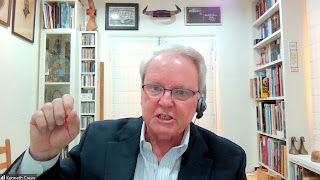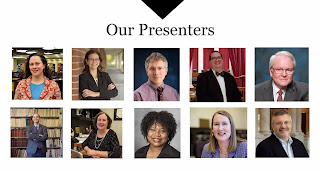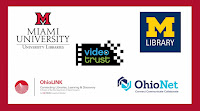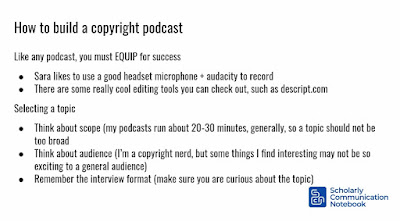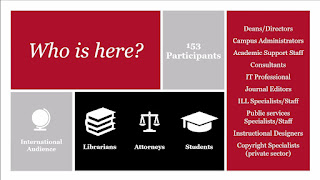This session is "Answering Tough Questions: Consultations and Policy Development."
Presenters: Kenneth D. Crews and Jack Bernard
Description: As copyright librarians, we are sometimes asked to be involved with challenging consultations, projects, or policy development. In this session, we’ll identify ways to help efficiently guide our libraries and library patrons through these situations and establish balance between the rights of content creators and those seeking to reuse works.
Conference host, Carla Myers, reminded us that the copyright community is a welcoming one. She is thankful for those who are presenting this year and have presented in the three previous years.
Jack Bernard has done work with HaithiTrust.
This was a Q&A. Questions are in bold below.
Crews: What do we mean by tough copyright questions? Difficult? Unusual? Complex? Mysterious? The mythology of copyright? Questions can be tough because of sensitive situations, emotional investment, financial investment, etc.
Bernard: Tough could be because of a tight timeline or risk. It could be tough because we see a copyright concern, when the person who has sought us out does not. Context matters incredibly.
Crews: Some people are risk tolerant and look for forgiveness if something goes wrong. Others are not risk tolerant. Those are not risk tolerant will not be happy if contacted by a copyright owner. A publisher, for example, may not be risk tolerant because of their investments in a project. Risk changes depending on the situation and people involved.
Bernard: Risk is a X-Y graph. Risk is on the X-axis. The Y-axis is how likely someone will care. There could be more factors, but this is a simple way of thinking about risk. Are you willing to endure any transaction?
Crews: An additional variable on a scaleis decision-making. So not just one item, but making a decision that will affect multiple items. For example, deciding to digitize all dissertations for a university. Can you make sweeping decisions? We will error by being over protective or by being under protective. How big of a mistake are you willing to absorb? Who should make the decision?
Bernard: He talked about how complex dissertations are! They could include databases, for example. Our old fashion systems cannot handle those layers and layers of complexity.
Crews: And what will the university's alumni think about their dissertations being digitized? That adds to the complexity. Should you ask your alumni for permission?
Bernard: Don't ask for permission. BTW once a dissertation is online, search engines might find plagiarism.
Crews & Bernard: What if a person said they had a dissertation and no dissertation is digitized or discoverable...and the institution can't find it? Digitization finds a flaw in that person's past!
How do you evaluate risk practically? What considerations do you take into account? How to explain risk to people who do not understand copyright?
Bernard: We set standards at our institutions. Get to know the attorneys at your institution and have an open dialogue. It is perfectly fine that your interpretation is different than ours, but recognize that our standards and practices are different. Don't feel that you always need to engage in a copyright 101 or 501 class on the fly.
Crews: Think about a policy that has gone through a vetting process. The policy can be instructive and an educational tool. It also guides you. That policy then helps you address the person who has a copyright question. If that is not satisfactory, then the policy should tell them who to contact.
Bernard: Some of you might be "the copyright person." You might be reluctant to pass the question to someone else, especially if they are highly knowledgeable about copyright.
People who are really serious about this issues will be willing to invest time to improve the system.
Be willing to hire someone to help you develop policies, etc., if you need it.
Crews: He has been inside counsel and outside counsel. He noted that pressure is on the outside counsel more in assuring that the questions are answered properly. They are the last line of defense.
I think preservation questions under Sect. 108 very difficult -- where is the nexus with fair use?
Bernard: He started with Section 106 (of course!). It begins with noting Sections 107-122. Some of those things in Section 107-122 are fair use and some are not, but we're giving people rights to use.
Crews: Section 107 uses the word "consider". The four factors are to be considered. It does not give exact answers and many people had questions, which led to Section 108-122.
Section 108 let's libraries to make use of works in their collections in different, specific ways. The preservation statutes in Section 108 are specific, even if some words are not defined (e.g., library). For example, you can make preservation copies of unpublished works in specific circumstances. You need to work through the statute - slowly - and see what Congress wants you to do.
Bernard: Preservation is not a hard problem, but how to you use what you preserve? That is hard. Efforts to preserve things will not be the problem. But then there will be new appetites for how to use those works. That is where the challenges and potential problems will lie.
Crews: Section 108 in terms of preservation is pretty good, but it has limitations. He notes that some sections - like this - are the result of lots of lobbying. Congress does want to give the library useful exceptions, but various industries don't want Congress to give libraries too much power.
In 1998, there was an amendment to Section 108 to makes explicit the ability to make digital copies. Libraries wanted it to be explicit, but then Congress added text to make the entertainment industry happy (e.g., restrictions on the distribution of the high quality digital master). There are sections of this statute that need to be followed closely.
If you can fit your activity satisfactory into a specific statute, do it. But if your activity is not fit into a specific statute (108-122), go back to fair use. Evaluate whether if your activity can fit into fair use. Maybe yes. Maybe no. Maybe you need to modify your use.
Bernard: Sections 108-122 are designed to be easier than fair use. But remember you can do a fair use evaluation.
Section 107 is the trickiest for music! Bass line (Under Pressure) or chord structure? or remixes? or arrangements, samplings...
Crews: I don't know if that makes fair use trickier. What is the use?
Bernard: We spend more time romancing the issues. And there are music bounty hunters. Music has also gotten more complex.
The public performance rights for music have been cut up into small piece, which becomes problematic.
Both Crews and Bernard talked a bit more about music, based on comments in the Zoom chat. Bernard noticed that even sampling small pieces can get someone into trouble. Crews even mentioned Katy Perry and "Dark Horse."
[The conversation shifted to e-reserves, which was something in the session description.]
Crews: E-reserves! We think of this as a library question, but it's not really. It is not in Section 108.
Many universities and colleges have policies which the instructors and librarian use. Be wary of word count guidelines and simple answers. Can we use the four factors of fair use in this context? What are the details?
How much time will be spent thinking about fair use? Could the time and energy be offset by taking a different course? Can you be more creative? For example, rather than making copies of two chapters for each student in your class, buy a copy of the book for each student.
Bernard: Walked through a similar scenario. In his example, he told the faculty member to keep notes of how the decision was made.
If the book isn't in yet for a class, can a few portions of the book be made available for students?
Bernard: He feels this would be low risk. He also said publishers often will provide copies of introductory chapters, knowing that books are being purchased.
What is a public performance?
Bernard: Many places that seem very private to use are public places under copyright law. Private places are your house or your hotel room, for example. A wedding, which may be a private affair, are considered a public place.
Crews: The definition of "public" is troublesome. He notes the details (in the bold text below), which are often forgotten.
From Section 101:
To perform or display a work “publicly” means—
(1) to perform or display it at a place open to the public or at any place where a substantial number of persons outside of a normal circle of a family and its social acquaintances is gathered; or
(2) to transmit or otherwise communicate a performance or display of the work to a place specified by clause (1) or to the public, by means of any device or process, whether the members of the public capable of receiving the performance or display receive it in the same place or in separate places and at the same time or at different times.
Section 110 notes what can happen in a live face-to-face classroom. Section 110 exists to give greater certainty. It must exist, because the behavior - showing a movie in the classroom - could be a copyright infringement ("substantial number of persons outside of a normal circle of a family and its social acquaintances").
Bernard: Courts are likely to take a narrow view of what is private and an expansive view of what is public.
In conclusion...
You don't have to be a lawyer to be knowledgeable about copyright and help your institution make thoughtful decisions. Copyright is not simple to apply, so learning and applying it is not for everyone.
Think about the whole ecology of your institution. If you are going to disrupt the ecology too much, your risk goes up.
Crews: Look at the statutes. Be flexible on what the words mean, especially those that are not defined in the law. Always give yourself an out, while recognizing that there are exceptions. Remember that there may be multiple routes to get to the use you want.
About Kenny Crews' background, @RateMySkypeRoom (a.k.a. Room Rater) on Twitter said: "Good depth. Horns.* We are pro duck. Lighting needs a tweak. 9/10 @kcrews *Horns are not considered taxidermy which is the ultimate Room Rater violation."

